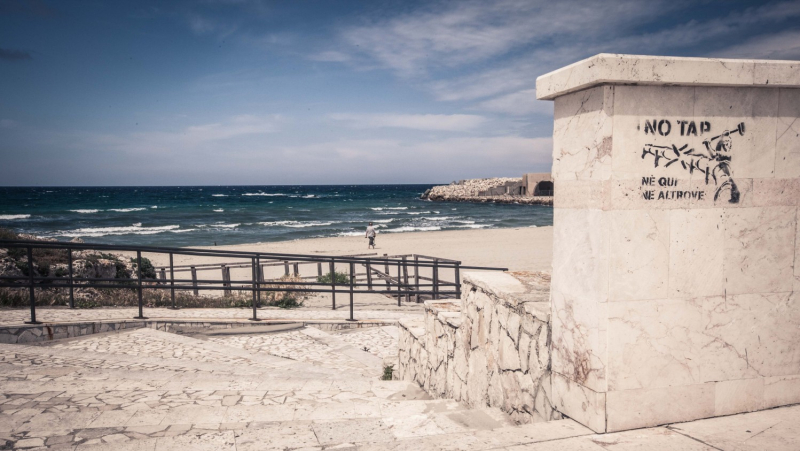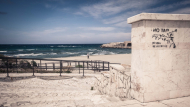Trans Adriatic Pipeline: France provides massive financial support to controversial gas project
Lorette Philippot, Tel: +33 640188284; Email: lorette.philippot@amisdelaterre.org

Lorette Philippot, Tel: +33 640188284; Email: lorette.philippot@amisdelaterre.org
The European Investment Bank (EIB) has announced that the required financing of € 3.9 billion for the development of the Trans Adriatic Pipeline (TAP) project was finally put in place in December 2018. [1] Among the list of project supporters are the public investment bank BpiFrance, the credit insurance company Euler Hermes, and the commercial banks Société Générale, BNP Paribas, Crédit Agricole and Natixis.
Friends of the Earth France has criticised this scandalous, blanket support from France’s public and private sectors for a useless project, which flies in the face of the climate emergency and also threatens local communities.
Seventeen commercial banks in total are taking part in this loan alongside the EIB and the European Bank for Reconstruction and Development (EBRD). Among them, four French banks: Société Générale (the financial adviser for the project), BNP Paribas, Crédit Agricole and Natixis. The TAP project is also benefitting from direct support from the French government, through guarantees granted by the public investment bank Bpifrance of 450 million euros and the credit insurance company Euler Hermes – part owned by the French state – of 280 million euros. [2]
The TAP gas project is controversial for various reasons. The benefits it will bring in terms of security of supply for Europe - the main justification for the project – have been called into question due to the development of other gas projects on the continent. [3] In Italy, one of the transit countries, an investigation is currently under way focused on 15 industry representatives alleged to have been involved in environmental and administrative violations. [4] Friends of the Earth France denounces the European strategy of proliferating gas infrastructures, which is acting as a brake on the clean energy transition.
Lorette Philippot, private finance campaigner at Friends of the Earth France, said:
"For months, we have been questioning the public and private banks, asking them not to support this mega gas pipeline which is completely at odds with the fight against climate change and is already producing serious social and economic impacts on communities in the vicinity of the project."
However, the banks have made every effort to make TAP possible. Société Générale advises the consortium on the development of the project, the loans from the EIB and the EBRD provide a political guarantee to the project, the guarantees from Bpifrance and Euler Hermes limit the project risks for commercial banks, and the latter ultimately provide the bulk of the capital.
Cécile Marchand, campaigner on climate and public actors at Friends of the Earth France, commented:
"There is no good reason for the French government to justify its direct support for the TAP gas project. Throwing out the Paris Agreement to help French companies export is intolerable. It is high time for France to reflect on its support for fossil fuels via its export credit agency."
According to Friends of the Earth France’s calculations based on Bpifrance Assurance Export publications, the public institution has provided approximately €1.4 billion to the fossil fuel sector since 2017. [5] Friends of the Earth France is calling on the government of Edouard Philippe to go further than the commitments made by the previous government and exclude all fossil fuels from export credit agency support, and not just coal.
Notes for editors:
1. See the EIB press announcment of January 11, 2019.
2. Other than the four French banks, the following commercial banks have also been identified by the EIB as participants in the TAP financing: Bank of China Limited, CaixaBank, Landesbank Hessen-Thüringen Girozentrale, ING, Intesa Sanpaolo, Mizuho, MUFG Bank, Siemens Bank, Standard Chartered, Sumitomo Mitsui Banking Corporation, Korea Development Bank, UBI Banca and UniCredit.
3. See January 5, 2019 article on TAP in The Economist.
4. See Italian media reporting on the ongoing legal investigation.
5. See the Bpifrance publication.

